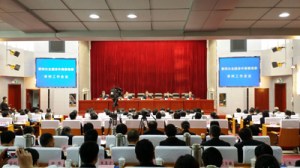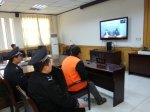The integration of China with the outside world through investment, trading, shipping, and licensing, inevitably (in some cases) leads to litigation in a Chinese courtroom (even if a contract has an arbitration clause), as companies large and small have found out. Some recent examples are listed below:
- Interdigital vs. Huawei;
- Invista Sarl v. Zhejiang Yisheng Petrochemical (Invista Sarl is a Koch Industries subsidiary)
- Maersk Shipping v. Xiamen Penavico
The Supreme People’s Court (Court) recently held its 4th National Work Conference on Foreign-Related Commercial and Maritime Adjudication (4th National Work Conference) in early November, shortly after the 4th Plenum. This is a conference that the Court organizes occasionally for judges hearing commercial and maritime cases involving foreign parties. The Court uses work conferences to transmit the latest central legal policy, harmonize court practices consistent with those policies, and find out what the latest difficult legal issues are. (This is a practice similar to other Party/government agencies).
The 4th National Work Conference highlighted some of the provisions of the 4th Plenum:
- Vigorously participate in the formulation of international norms;
- Strengthen our country’s discourse power and influence in international legal affairs;
- Strengthen law enforcement and judicial cooperation between the mainland, Hong Kong, Macau and Taiwan;
- perfect our country’s judicial assistance systems;
- ensure that the courtroom hearings play a decisive role.
Additionally, the Court emphasized other principles such as —
- vigorously asserting jurisdiction (which is also asserted vis a vis the Hong Kong courts–see this commentary on a Hong Kong divorce case), which deserves closer attention in Hong Kong;
- Correctly applying international treaties and governing law principles.
- Safeguarding national rights and interests.
Some background if you need it
“Foreign-related” is a concept of many years standing that means that a foreign element is involved, because of a party’s nationality, location of the property disputed, or other factors (as explained here).The concept of “foreign-related” further relates to other important questions, such as selecting arbitration outside of China and foreign governing law.
Following national work conferences, the Court often issues follow-up “Conference Summaries” to guide the lower courts on the agreed upon approach to new or contentious issues. These do not have the status of a judicial interpretation but courts refer to them when deciding cases. According to Court rules, courts can cite judicial interpretations (but not Conference Summaries). It doesn’t seem that the Conference Summary has yet been issued.
Status update on foreign-related cases in the Chinese courts
In China, 203 intermediate and 204 basic level courts have jurisdiction over first instance foreign-related cases. In the period 2010-end June 2014, the Chinese courts heard 287,262 first and second instance cases foreign-related maritime and commercial cases, an increase of 41% over the previous period. The cases are mostly heard by courts in coastal areas, but as foreign investment goes inland, disputes inevitably follow.
Head’s up for the foreign legal community
Following the Work Conference, Judge Luo Dongchuan, head of the #4 Civil Tribunal of the Court, was interviewed by Legal Daily. Judge Luo mentioned many important future legal developments, highlighted below.
1. Reforms relating to four important practical issues
- Establishing an electronic platform for service of legal process outside of the jurisdiction (intended to mean Hong Kong, Macau, Taiwan, as well as foreign countries);
- Investigating and obtaining evidence (this is likely linked to current anti-corruption efforts by the Chinese government to pursue (and retrieve assets from) corrupt officials who have settled overseas)
- Determining foreign law, through establishing a database of experts (Chinese and foreign).
- Restricting parties to litigation from leaving China (Chinese legislation on these procedures is difficult to parse (see my earlier article on this subject and another related one).
2. Maritime court related reforms
- The Court is considering establishing maritime circuit courts, to deal with disputes arising inland arising from logistics cases in the maritime courts.
- The Court intends to promote the maritime courts and a forum for hearing cases involving maritime pollution from on-shore sources (the largest source of maritime pollution China).
- The Court is looking into reforming the maritime court’s jurisdiction, so that it will have jurisdiction over civil, criminal, and civil maritime cases.
3. Recognition of foreign court judgments
Judge Luo mentioned that the Court is researching the recognition and enforcement of foreign court judgments involving property. (This appears to be at an early stage.)
3. Arbitration related reforms
Judge Luo emphasized that the Court supports arbitration.
Because arbitration is so important, the Chinese courts will try to uphold the validity of vague [poorly drafted!] arbitration clauses.
A new judicial interpretation on the judicial review of arbitration-related issues will go into the Court’s judicial interpretation drafting plan in 2015.
The Court intends to reform jurisdiction in judicial review of arbitration issues, to consolidate them in specialized courts, expanding the pilot projects underway in Guangdong, Inner Mongolia, and elsewhere (as designated by the Court. Earlier this year, the Guangdong Higher People’s Court published a report on its experience so far.
4. Electronic platform
The Court is considering establishing an electronic platform for foreign-related cases. This may relate to making litigation procedures for parties more transparent.
Some unsolicited suggestions for the Supreme People’s Court
Consider the following:
- Overhaul the Court’s English language platform, so that it provides useful official information for the foreign reader who does not know Chinese;
- Issue more draft judicial opinions for public comment and give the public (foreign and Chinese) a more sensible time period to comment, particularly for draft regulations relating to any of the issues discussed above. The issues mentioned above are very important to the foreign business and legal community. The current 30 day time period extremely short by international standards. Given the opportunity, international and foreign organizations and law firms will comment, but it takes time for translation and busy lawyers and other legal professionals to make comments.
- Consider what can be done to make the Chinese courts a more user-friendly forum for international commercial disputes. For example, consider what is needed for China to become a party to the Hague Convention on the Legalization of Foreign Public Documents (which will involve reforms by multiple government departments) and other related conventions. The current system of legalization of foreign evidence is difficult for foreign parties and puts the Chinese system behind the 107 countries in the world that are signatories).









You must be logged in to post a comment.